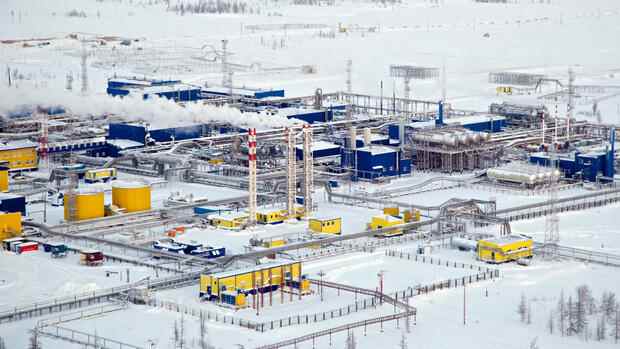Wintershall Dea is involved in three joint venture companies in Russia.
(Photo: dpa)
Dusseldorf The German oil and gas producer Wintershall Dea is increasingly being criticized. A Russian joint venture between Wintershall and the Gazprom group is to deliver gas condensate to one of the most important suppliers of the Russian Air Force. This is reported by the “Spiegel” and the ZDF political magazine “Frontal” on the basis of joint research.
Wintershall is a subsidiary of the chemical group BASF and produces gas in Siberia in the so-called Urengoyskoye field. According to the report, gas condensate is produced as a by-product and is sold on to Gazprom. According to their report, Der Spiegel and ZDF-Frontal were able to trace deliveries of aviation fuel to Morosovsk and Voronezh near the border with Ukraine from a Gazprom refinery. There are air bases with Russian fighter-bombers. According to Der Spiegel, Wintershall cannot rule out that the extracted gas condensate will also be used for military purposes.
Ukrainian government representatives sharply criticized Wintershall to Spiegel and ZDF. Deputy Justice Minister of Ukraine Iryna Mudra told the media: “Making a profit in Russia, paying taxes in Russia and keeping Russia’s economy afloat is nothing but taking part in the war.” Oleg Ustenko, economic adviser to Ukrainian President Volodymyr Zelensky, announced that Wintershall Dea would be held accountable after the end of the Ukraine war at the latest.
Wintershall firmly disagrees with the allegations. The head of the Kassel company, Mario Mehren, said on Friday evening: “We reject the connection suggested by Spiegel between the gas condensate produced by the joint ventures in Russia and the painful death of people in Ukraine as constructed and dishonest.” The company also reserve the right to take legal action.
Top jobs of the day
Find the best jobs now and
be notified by email.
Mehren said: “If the impression is given that the condensate from the Achimov formation, in the production of which Wintershall Dea is involved via a joint venture, is used directly or understandably indirectly for the war of aggression, this is dishonest and untenable.”
Wintershall: Achimov condensate not suitable for military kerosene
Wintershall is involved in a total of three joint ventures in Russia, two of which also produce gas condensate from the so-called “Achimov horizon”. However, Wintershall takes the position that it has no contractual relationship with the company that processes this gas condensate. In addition, most of the processed condensate remains in districts without military sites that are important for the war. Because the condensate is not suitable for the production of kerosene for military use.
In principle, however, environmentalists repeatedly accuse Wintershall of still being active in Russia despite the Ukraine war. In the months following the Russian invasion of Ukraine, several German corporations announced their intention to withdraw from Russia. As early as April, the food manufacturer Dr. Oetker sold its Russian plant to the local management.
Europe’s largest shoe retailer, Deichmann, also announced in June that it had sold its 37 branches with 260 employees, including inventory, to a member of the Russian management.
Not so Wintershall. The company would like to be out of Russia long ago – at least that’s what CEO Mario Mehren says. Regarding his Russian business, Mehren argues that any change in holdings in Russia would require direct approval from the Russian president. Wintershall cannot simply give up the drilling sites in Russia, abandon employees and leave the platforms to the Russians. And there is no buyer in the current situation either.
>> Read also: Why German companies can’t just withdraw from Russia
The Wintershall subsidiaries in Russia continue to pay taxes to the Russian state and thus support it financially. But even without Wintershall participation, this money would probably continue to flow.
Wintershall CEO Mehren: “Our earnings are trapped in Russia”
What speaks for Wintershall’s argument: Wintershall’s economic interest in its Russian subsidiaries is likely to be limited. The Russian business was lucrative for a long time and could continue to be so, especially in times of high oil and gas prices. But the profits can only be used locally in Russia. Due to the EU sanctions against Russia, Wintershall does not get the money to Germany.
At a presentation of the quarterly figures in October, Mehren said when asked by the Handelsblatt: “Our income is trapped in Russia. We haven’t received any money from the country since February of this year.” It remains to be seen whether and when Wintershall will have access to the money that the company is “presumably currently” earning in Russia.
More: Battle of the drones for air supremacy: Ukraine is the testing ground for the warfare of the future

